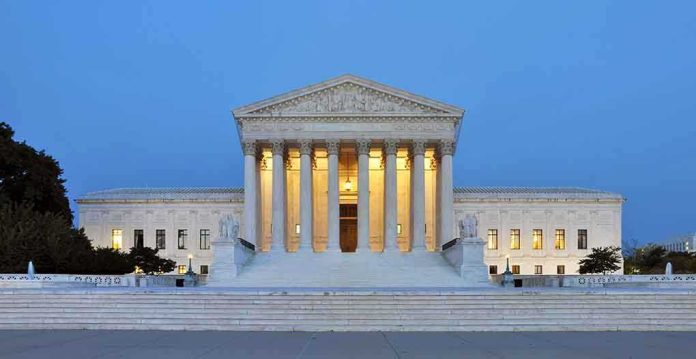
Justice Clarence Thomas’s explicit call to overturn same-sex marriage protections may finally get the Supreme Court case he’s been waiting for, threatening to dismantle constitutional protections that millions of Americans depend on.
Story Snapshot
- Thomas’s Dobbs concurrence specifically named Obergefell v. Hodges for reconsideration
- Kim Davis litigation continues creating potential pathway to challenge same-sex marriage rights
- Supreme Court formally asked to overturn landmark same-sex marriage ruling
- Religious liberty advocates see opportunity to roll back judicial overreach
Thomas Issues Direct Challenge to Marriage Precedent
Justice Clarence Thomas delivered a bombshell concurrence in the 2022 Dobbs decision that sent shockwaves through constitutional law. Thomas explicitly stated the Court “should reconsider all of this Court’s substantive due process precedents,” specifically naming Obergefell v. Hodges among the cases requiring fresh scrutiny. This represents the most direct challenge to same-sex marriage protections from a sitting Supreme Court Justice, signaling his willingness to overturn judicial precedents that lack firm constitutional grounding.
The Thomas concurrence stands in stark contrast to the Dobbs majority opinion, which attempted to limit its scope to abortion rights alone. While Justice Alito’s majority opinion claimed the decision wouldn’t affect other precedents, Thomas made clear his view that substantive due process doctrine itself requires fundamental reconsideration. This creates a constitutional tension that legal scholars recognize could reshape multiple areas of American law.
Kim Davis Case Provides Strategic Vehicle
Former Rowan County clerk Kim Davis’s principled stand against issuing same-sex marriage licenses continues generating federal litigation that could reach the Supreme Court. Davis refused to violate her religious convictions after Obergefell was decided in 2015, leading to her imprisonment for contempt and subsequent civil rights lawsuits. The ongoing damages and qualified immunity proceedings in her case present exactly the type of vehicle Thomas needs to revisit Obergefell’s constitutional foundations.
Religious liberty advocates view the Davis litigation as a perfect test case for challenging the scope of Obergefell’s mandate on public officials. The case raises fundamental questions about whether government employees can be forced to participate in ceremonies that violate their deeply held religious beliefs. These issues directly implicate the balance between newly created constitutional rights and long-established First Amendment protections that predate the republic itself.
Constitutional Foundations Under Scrutiny
The substantive due process doctrine that underlies Obergefell represents exactly the type of judicial activism that constitutional originalists have long criticized. Thomas’s approach focuses on whether rights are “deeply rooted in this Nation’s history and tradition,” a standard that same-sex marriage clearly fails to meet given America’s historical understanding of marriage as between one man and one woman.
Dobbs established the precedent for overturning substantive due process decisions that lack historical foundation, demonstrating the Court’s willingness to correct past judicial overreach. The decision returned abortion regulation to elected officials rather than unelected judges, reflecting proper constitutional governance. Thomas’s concurrence suggests this same approach should apply to other precedents built on shaky constitutional ground, including Obergefell, Lawrence v. Texas, and Griswold v. Connecticut.
The ongoing appeals process in Davis-related litigation continues generating the type of constitutional questions that could eventually reach the Supreme Court for review. While Obergefell remains binding precedent for now, the combination of Thomas’s explicit invitation for challenges and active litigation testing its boundaries creates unprecedented opportunity for reconsideration. Conservative legal advocates recognize this represents the best chance in years to restore constitutional limits on judicial power and return marriage policy to the democratic process.
Sources:
Dobbs v. Jackson Women’s Health Organization
Dobbs v. Jackson Women’s Health Organization – National Constitution Center
Dobbs v. Jackson Women’s Health Organization (2022) – Cornell Law School
Dobbs v. Jackson Women’s Health Organization – SCOTUSblog







